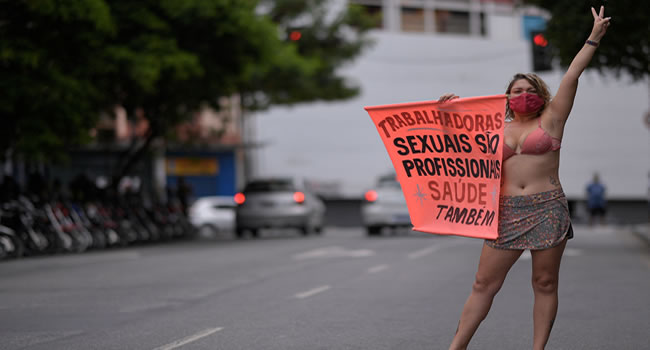International
Brazilian prostitutes begin strike, demand COVID-19 vaccination

Prostitutes in the Brazilian city of Belo Horizonte have embarked on a week-long strike to press home their demand for inclusion in the group of front-line workers receiving priority COVID-19 vaccines.
The strike action which began on Monday almost turned violent on Wednesday when police tried to disperse the protesting sex workers who took to the streets and carried placards with various inscriptions such as: “Health ministry please include us sex workers as a priority vaccine group,” “Sex workers are a priority group,” and “Sex workers are health professionals too.”
President of the Association of Prostitutes of Minas Gerais state, Cida Vieira, who is one of the organisers of the protest, said the pandemic had forced the city council to close hotels in the southeastern city of Belo Horizonte, thereby forcing thousands of prostitutes to solicit for clients on the street.
READ ALSO: Islamic cleric Gumi likens Nigerian politicians to prostitutes
She said: “We are a priority group, we are health educators, peer educators. We form part of that group since we give information about STIs for men and distribute condoms.
“We are in the front line, moving the economy and we are at risk. We need to get vaccinated.”
Another sex worker, Lucimara Costa, added: “We are part of the priority group because we deal with various types of people and our lives are at risk.”
The COVID-19 pandemic has killed 332,000 people in Brazil, a toll second only to the United States.
Join the conversation
Support Ripples Nigeria, hold up solutions journalism
Balanced, fearless journalism driven by data comes at huge financial costs.
As a media platform, we hold leadership accountable and will not trade the right to press freedom and free speech for a piece of cake.
If you like what we do, and are ready to uphold solutions journalism, kindly donate to the Ripples Nigeria cause.
Your support would help to ensure that citizens and institutions continue to have free access to credible and reliable information for societal development.
























